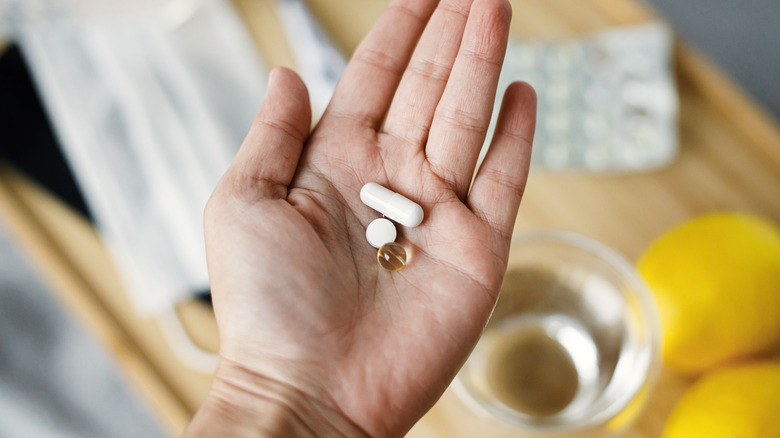The Vitamins You Should Be Taking In Your 20s
We're all looking for ways to be healthier, and a seemingly easy solution is to add some vitamins to our daily routine. Vitamin ads are everywhere, promising everything from longer hair to better skin to a healthier digestive system. But are they really necessary? The answer depends on your unique lifestyle and health needs. In general, experts agree that the best way to get the vitamins and minerals your body needs is to eat a well-balanced diet (via Penn Medicine). Nutrients from real food will be used as efficiently as possible and the average person won't need any vitamins if they eat enough fruits, vegetables, whole grains, and protein each day.
However, supplementing an already healthy diet can potentially offer even more health benefits with little risk. "Supplements are meant to be supplementary — meaning they enhance benefits already provided by eating a well-rounded diet," said Jeffrey Millstein, MD, physician at Penn Internal Medicine Woodbury Heights. People at certain ages may benefit from adding a few more vitamins to enhance the healthy foods their bodies are already working with. According to The Healthy, taking vitamin D and calcium supplements during your tween and teen years and into your twenties can help your body build strong bones. Women in their twenties who are trying to get pregnant may also want to take a prenatal vitamin containing folic acid and B vitamins, which support a healthy pregnancy.
How your diet affects the vitamins you need
It's not uncommon for people to experiment with different diets in their 20s as they try to find lifestyle choices that they enjoy. If you are currently on a vegan diet or considering trying one, you'll need to take vitamin B12 to stay healthy (via Healthline). This vitamin is typically found in meat and dairy products, so vegans can easily become deficient if they don't take a supplement. Vegans should also consider taking vitamin D, long-chain omega-3s, iron, calcium, zinc, and iodine supplements. Vegetarians would also benefit from these vitamins.
If you think you could benefit from taking vitamins, it's best to speak with your doctor first. While taking vitamins is generally safe, most products are not regulated by the FDA and can pose a risk to certain individuals. It's always smart to speak to your healthcare provider before adding any vitamins or supplements to your diet. They can make sure the vitamins won't interact with any medications you are on, as well as help you find ways to get those vitamins through food instead if possible.


